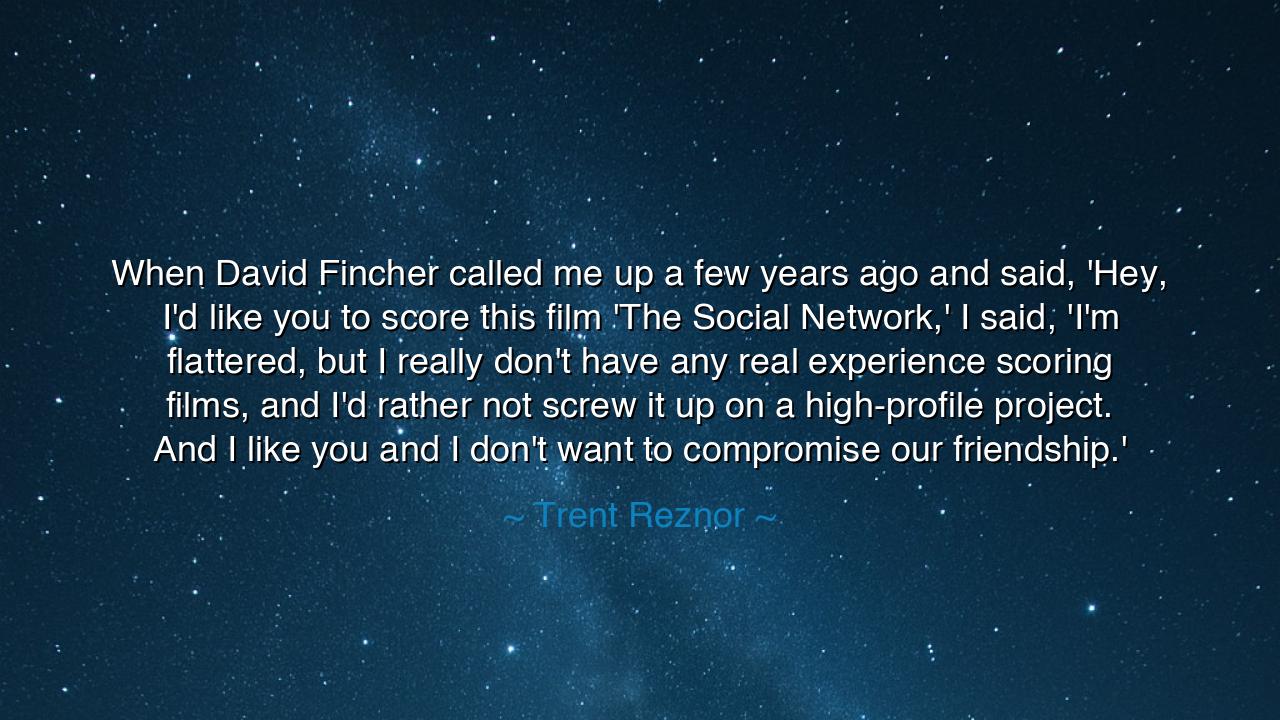
When David Fincher called me up a few years ago and said, 'Hey
When David Fincher called me up a few years ago and said, 'Hey, I'd like you to score this film 'The Social Network,' I said, 'I'm flattered, but I really don't have any real experience scoring films, and I'd rather not screw it up on a high-profile project. And I like you and I don't want to compromise our friendship.'






In the annals of human endeavor, there are moments when an individual is called to step into the unknown, to face a challenge that could define the course of their journey. Trent Reznor speaks to such a moment when he reflects on a conversation with David Fincher: “When David Fincher called me up a few years ago and said, 'Hey, I'd like you to score this film The Social Network,' I said, 'I'm flattered, but I really don't have any real experience scoring films, and I'd rather not screw it up on a high-profile project. And I like you and I don't want to compromise our friendship.'" These words speak not only to the humility of an artist, but also to the deep wisdom of recognizing one’s limitations and the strength that comes from the desire to preserve something as precious as friendship.
The ancient world was filled with heroes who, upon being asked to undertake a great task, would often hesitate, not out of fear, but out of respect for their own abilities and the relationship they held with those who entrusted them. Achilles, the great Greek hero, was known for his strength and prowess, but even he knew that his gift came with a burden. When he was asked to join the Trojan War, he hesitated, understanding that his actions would affect not only his own fate but the fate of his comrades. The humility he displayed—acknowledging his own limits and the potential consequences of his involvement—was what allowed him to ultimately step forward, not out of arrogance, but with the awareness of what was at stake. Reznor’s hesitation reflects this same depth of thought—a recognition that the integrity of friendship and the potential for failure in a high-stakes project could irreparably affect both.
In Reznor’s words, we find the wisdom of knowing when to step back. His reluctance to accept the offer from David Fincher, despite the honor it presented, speaks to a rare and powerful quality: the ability to value friendship over ambition, to acknowledge that relationships are more important than momentary success. This self-awareness is something that has been valued throughout history, for those who rush headlong into challenges without thoughtful consideration often risk losing not only the task at hand but the relationships they hold dear. The great philosophers of the ancient world, such as Socrates, often taught that true wisdom lies in the ability to recognize one’s limits, to know when to step forward, and when to remain humble.
Consider the ancient bond between King David and his trusted warrior, Jonathan. Though David was destined to become king, their relationship was not defined by rivalry or ambition but by mutual respect and loyalty. Their friendship was tested by the jealousy of Saul, Jonathan’s father, but they never allowed their personal ambitions to come between them. David and Jonathan showed that the preservation of friendship is not a passive act but an active choice, one that requires constant awareness and sacrifice. Reznor, in his hesitation, was driven by the desire to preserve his friendship with Fincher, choosing not to embark on the project if it would risk the trust between them.
The lesson in Reznor’s reflection is clear: true friendship and collaboration are built on the foundations of trust, understanding, and mutual respect. The decision to protect these values, even when the call of personal ambition is strong, requires a deep wisdom. To choose friendship over fleeting success or the allure of high-profile projects is to understand that the value of human connection far outweighs any momentary glory. Reznor's decision not to risk the friendship with Fincher over the potential to succeed in uncharted territory speaks to the timeless principle that the bonds we share with others are the truest measure of our success.
As we navigate the challenges in our own lives, we must remember Reznor’s wisdom—to be honest with ourselves about our capabilities, and to understand that true success is not always measured by achievement, but by the relationships we maintain along the way. Sometimes, stepping back from an opportunity, especially when it threatens the integrity of our friendships, is the most powerful choice we can make. In doing so, we preserve the deeper connections that shape us, and in turn, our success will be far more lasting and meaningful.
Let this wisdom guide us as we face our own crossroads. Let us value our friendships, not as fleeting alliances, but as the foundations of our journey. Let us also recognize that true strength lies not in our ambition alone, but in our ability to balance that ambition with the wisdom to protect what truly matters. Reznor's decision, rooted in self-awareness and respect for others, is a testament to the power of relationships—a lesson that transcends time and echoes the wisdom of the ancients.






AAdministratorAdministrator
Welcome, honored guests. Please leave a comment, we will respond soon